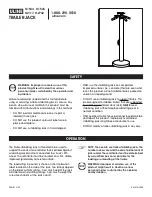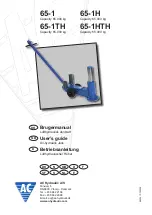
18
19
Vehicle lowering
DANGER!
Danger of personal injury!
If there are people, animals or other objects in or under the vehicle,
before lowering, this can cause personal injury or even death.
− Always ensure that the area under the vehicle is clear, that
there are no people, animals or objects under the vehicle,
before lowering.
− Always use the car jack to lower the vehicle.
1. Place the saddle
4
under the lifting point.
2. With the plug on the end of the jack handle
8
turn the release
valve
10
clockwise (see picture F).
3. Pump the jack handle to lift the vehicle somewhat above the
saddle(s) of the jack stand(s) (not included).
4. Remove the jack stands.
5. Very slowly turn the release valve anticlockwise, to lower the
vehicle to the ground.
6. Remove the car jack and ensure that the lifting arm
8
is fully
released.
7. Close the release valve by turning it clockwise.
Car jack use
Vehicle lifting
DANGER!
Danger of personal injury!
Never conduct work on, under or around a vehicle which is solely
supported by a car jack. The vehicle is not stable and can fall
suddenly and cause personal injury or even death.
− After lifting a vehicle with the car jack, always use jack stands
(not included). Do not rely on the car jack to support the vehicle.
1. Once the car jack is appropriately placed on the lifting point
of the vehicle, pump the jack handle
8
with smooth and full
strokes.
2. Raise the vehicle a few centimetres above the desired height.
3. Once the vehicle is lifted, push the jack stand with an
appropriate load capacity (not included) under the lifting point,
which can be found in the vehicle handbook. If you are using
two jack stands, place them on the same point and at the same
height on both sides of the vehicle.
4. The lifting point(s) on the vehicle must be in the middle of
the jack stand(s). Place the jack stand(s) in accordance with
the manufacturer’s instructions and ensure that they lock
appropriately into place.
5. Slowly turn the release valve
10
anticlockwise with the help of
the plug on the end of the jack handle, to lower the vehicle
onto the saddle(s) of the jack stand(s). Then firmly turn the
release valve clockwise, to close it (see
picture E).
6. Ensure that the load and the jack stands are stable and safely
placed. Neither the load nor the jack stands should move. If you
are unsure of the stability of the vehicle, use the car jack again
to raise the vehicle and then replace and secure the vehicle on
the jack stands.
Car jack use






























